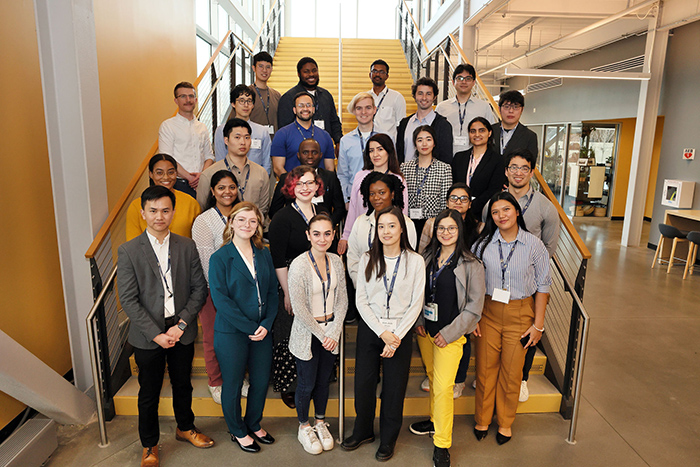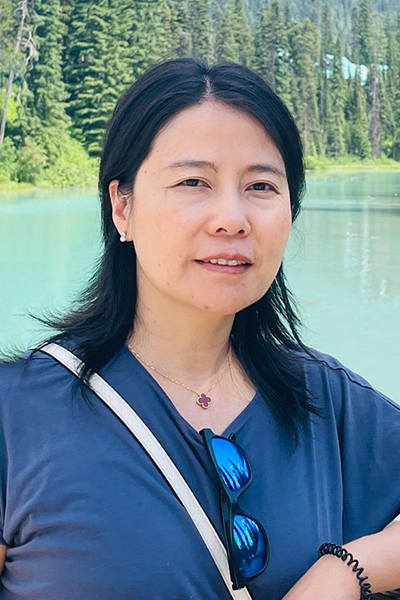Pioneering Progress
RBI’s historic fellowship program advances pulp and paper innovation.

A group photo of the current RBI Fellows.
The Fellowship Program at the Renewable Bioproducts Institute (RBI) is a unique program that has, over several decades, advanced graduate student research and leadership development in the forest products industry.
Funded through an endowment with a current value of $56 million, the program has produced hundreds of graduate scientists and a significant body of scientific research in the forest products industry.
The Georgia Tech Foundation manages the endowment, which originated from donors who are alumni of the Institute of Paper Science and Technology (IPST), the predecessor of RBI, and the Institute of Paper Chemistry, which preceded IPST.
The fellowship offers funding for up to four years for Ph.D. students and up to two years for M.S. students. It supports traditional teams, typically involving two faculty members and one student, and larger multidisciplinary teams with three or more faculty and multiple students. Each year, the program typically funds six to eight fellows, with a mix of traditional and larger-team projects.
Fellowships are awarded to students of eligible faculty based on their project alignment with the strategic thrusts of Georgia Tech and RBI, and research priorities in the bioeconomy. The recently awarded fellowships reflect the evolving portfolio of RBI’s research that continues to improve the environmental impacts and functionality of pulp and paper and focuses on new product classes derived from forest products. It includes technologies that produce chemicals, biofuels, and new materials from forest raw materials, including nanocellulose. Faculty researchers benefit from leveraging RBI’s fellowships to explore new areas of research and are encouraged to provide matching funds for federal and other external funding.
“The goal [of the fellowship program] is to find synergy between the objectives for RBI’s industry members with creative technology innovations of Georgia Tech faculty and ensure that the research supports both current and future advancements in the field.” —J. Carson Meredith
Fellowship projects span various fields, from experimental and modeling work to applications of machine learning and artificial intelligence, as well as economics, business, life cycle analysis, and sociological studies.

J. Carson Meredith is the Executive Director of the Renewable Bioproducts Institute.
Eligible candidates come from a wide range of schools and programs at Georgia Tech, including engineering, chemistry, public policy, and building construction, among others. A unique aspect of the program is the minor requirement, which includes nine hours of coursework: two core courses in pulp and paper manufacturing and emerging technologies of forest products, and one elective tailored to the student’s research focus.
The annual selection process for the fellowship is rigorous: research proposals and abstracts submitted by faculty go through multiple reviews, including peer faculty, the RBI Fellowship Academic committee, the RBI executive team, and RBI’s industry members.
Another goal of the program, in addition to addressing the strategic objectives of RBI and the bioproducts industry, is to foster collaborations that are both use-inspired and pre-competitive, to build thought leadership and credibility for future funding opportunities.
“The fellowship program underscores RBI’s commitment to advancing innovative pulp, paper, and bioproduct technology,” said Carson Meredith, RBI executive director. “The goal is to find synergy between the objectives for RBI’s industry members with creative technology innovations of Georgia Tech faculty, and ensure that the research supports both current and future advancements in the field.”
Read on to explore the profiles of past RBI Fellows who are now making significant contributions in industry and academia, faculty advisors sharing their perspective on the program’s impact, and the current fellows talking about how the fellowship helps them with their research and professional development.
Greg Fike
Vice President of Research and Development, Dixie® at Georgia-Pacific LLC

Greg Fike serves as the vice president of Research and Development at Georgia-Pacific. He earned his doctoral degree in chemical and biomolecular engineering with an emphasis on paper science and engineering from Georgia Tech in 2005. Shortly after, he joined Georgia-Pacific as a research scientist. Over the years, Fike has advanced to his current role, where he leads the R&D teams supporting the Dixie® business. He recalls his time as an IPST Fellow, reflecting on how the fellowship influenced his career trajectory.
“I was at the Institute of Paper Science and Technology from 1999 to 2005, working under the mentorship of Professor Emeritus Sujit Banerjee. My Ph.D. thesis focused on adhesive polymer film development through surface characterization, while my master's thesis utilized infrared thermography to image the drying of polymer surfaces. Being part of the IPST research community allowed me to interact with distinguished Georgia Tech researchers and other IPST RBI Fellows, who influenced my development as an engineer and helped shape my research. Additionally, I had the privilege of teaching, which enabled me to engage with a diverse array of students from various majors. Upon starting my career at Georgia-Pacific in Neenah, Wisconsin, I had the opportunity to connect with many IPC alumni who helped broaden my professional network. During my time as a Fellow at IPST, I got to know IPST's history and its evolution over time. I recall the challenging transition from a private school to becoming part of Georgia Tech, but the Renewable Bioproducts Institute has maintained its mission and continues to support student research effectively."
Chris Luettgen
Executive Director of APPTI and RBI Initiative Lead for Process Efficiency and Intensification of Pulp, Paper, Packaging, and Tissue Manufacturing

Chris Luettgen is a professor of the practice in Georgia Tech’s School of Chemical and Biomolecular Engineering and is RBI’s lead for the process efficiency and intensification of pulp, paper, packaging, and tissue manufacturing initiative. He also holds an external position as executive director of The Alliance for Pulp and Paper Technology Innovation (APPTI). Luettgen is an RBI (IPST) Fellow who graduated in 1991. He has over 25 years of industry experience, with Scott Paper and Kimberly-Clark Corporation and has held positions in product development and innovation as well as in capital project management and manufacturing facility leadership.
For several years, Luettgen has served on the Georgia Tech Renewable Bioproducts Institute Industry Board of Advisors and currently serves as a faculty advisor for the student chapter of TAPPI. Luettgen provides his perspective on the RBI Fellowship program:
“It has been inherently interdisciplinary, even before it required proposals from multiple schools. My own thesis combined fluid dynamics with surface chemistry, and many other fellows from my time had to integrate different disciplines to complete their work. This environment fostered lifelong friendships with classmates -- including my friend Chris Farrell, now an expert in evaporators at International Paper, and Dan Bunker, a senior researcher in Stockholm. Upon graduating, I had nine offers in the paper industry, ultimately choosing Scott Paper Company to help start a Greenfield mill. This decision led to a rewarding career in consumer products, diverging from my initial path and providing a unique and fulfilling experience. Now, the fellows often find careers in national labs, academia, chemical companies, and notably, Intel's packaging division.”
Zhaohui (Julene) Tong
Associate Professor, School of Chemical and Biomolecular Engineering, and RBI Initiative Lead: Waste Valorization in Food-Energy-Water

Julene Tong’s research addresses challenges in the interdisciplinary fields of bioresource engineering and sustainable chemistry, focusing on developing innovative technologies for producing chemicals, materials, energy, and fuels from renewable resources. Tong was an RBI Fellow while pursuing her doctoral degree at Georgia Tech and now is a faculty advisor for RBI Fellows.
“The RBI Fellowship Program has played a significant role in shaping my career by providing invaluable support and opportunities. First, the program allowed me to work on generating preliminary data, a crucial step for securing grant funding and advancing my research. It also fostered interdisciplinary collaboration by connecting me with faculty from other academic units, enriching my perspective and broadening the scope of my work. Presenting student posters at RBI workshops helped disseminate my research ideas to RBI-affiliated industries, member companies, and other key stakeholders, significantly enhancing my ability to pursue industry collaborations.
Additionally, the program trained students in emerging fields such as sustainable materials and biorefinery, equipping us with the knowledge and skills essential for successful careers in these cutting-edge areas. My experience as a fellow during my Ph.D. was remarkable. I fondly remember our team vacation in Savannah, Georgia, where I got a chance to know other fellows. One of them, Joseph, recommended me for my first internship at Kemira, a Chemical Company. It’s such a unique program that has profoundly affected the career path of so many, including me!”
Joe Bozeman III
Assistant Professor, School of Civil and Environmental Engineering and RBI Fellowship Faculty Advisor

Joe Bozeman spearheads the Social Equity and Environmental Engineering lab. Elnaz Jamshidi, a graduate student from the School of Materials Science and Engineering is a 2024 RBI Fellow working on the topic, “Sustainable Bonding: Enhancing Wood Strands Through Sodium Hydroxide Immersion Without Traditional Adhesives.” Bozeman also has two other RBI Fellows working on his research projects. Bozeman shares his perspective on the fellowship program from an advisor’s lens.
“The RBI Fellowship program was monumental in helping to establish my lab as a tenure-track, junior faculty. It provided funding for a few of my Ph.D. students with some investigatory latitude which facilitates organic idea and methodological formation across disciplines. It also helped to connect me and my research lab with vital industry partners and key academic administrators, and helped me to secure external funding through preliminary data development, publications, and the like.”
Opeyemi Ojelade
Graduate Student, School of Chemical and Biomolecular Engineering

Under the guidance of Christopher Jones and Sankar Nair, Ojelade's doctoral research focuses on developing a catalytic pathway to produce bio-lubricants and waxes from kraft black liquor-derived organic hydroxy acids. Originally from Nigeria, Ojelade enjoys spending quality time with his family and playing table tennis in his free time.
"The RBI fellowship is instrumental in my development as a graduate researcher. Through this support, I am advancing technology to convert biomass resources into bio-lubricants, pushing forward circular economy and biorefinery innovation. The fellowship not only provides a monthly stipend, allowing me to focus on my work, but also offers resources, mentorship, and a collaborative environment to drive important research and professional growth in sustainable technology."
Talia Thomas
Graduate Student, George W. Woodruff School of Mechanical Engineering

Thomas is a Ph.D. student and graduate researcher in the McDowell Lab for Battery Research. She is co-advised by Matthew McDowell and Kyriaki Kalaitzidou. Her current research areas include the characterization and functionalization of cellulosic matrices, solid-state battery chemistries, and developing novel lignin-based anode materials for high-performance battery systems.
"The RBI Fellowship has been instrumental to my research development at Georgia Tech. From a young age, I was always passionate about engineering sustainable systems for the greater good of both the environment and humanity. This fellowship has been pivotal in allowing me to pursue these passions and redefine technology pathways through cutting-edge battery research. I am also very grateful for the mentorship and professional development opportunities that have allowed me to network with key industry professionals in my field."
Preksha Vichare
Graduate Student, School of Materials Science and Engineering

Vichare is advised by Blair Brettmann and Victor Breedveld. She is a Ph.D. student and an RBI Fellow working on redesigning the dewatering process that will improve water removal prior to evaporation in paper machines.
“I always wanted to work on sustainable science and conduct research that connects the laboratory to the real world. As a fellow on this RBI project, I have an opportunity to be involved in the product's first stage of design for the paper manufacturing process. RBI is a great platform that allows me to connect with industry members who will help me gain insight into current developments that favor sustainability.”
Rebecca K. Banner
Graduate Student, School of Materials Science and Engineering

Banner is jointly advised by Michael Filler, Eric Vogel, and Victor Breedveld. Her doctoral research focuses on the mass customization of flexible microelectronics, utilizing advanced techniques such as electrohydrodynamic jet printing and silicon-on-insulator transistor fabrication.
“The RBI Fellowship has equipped me with invaluable resources and opportunities to engage in highly interdisciplinary research that breaks traditional field boundaries. Through this fellowship, I have been able to explore intersections between paper science, chemical engineering, semiconductor fabrication, and electrical engineering —an endeavor that would typically be difficult to pursue. As I progress in my program, I am committed to utilizing this interdisciplinary foundation to tackle longstanding challenges with fresh perspectives and creative solutions.”

Writer and Media Contact: Priya Devarajan | priya.devarajan@research.gatech.edu
Photos: Courtesy of Georgia Tech





